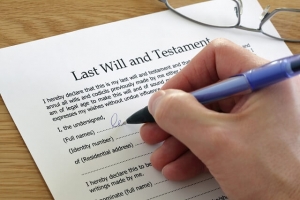
Following the death of a Florida retiree, it is not at all uncommon for the survivors to discover a “last-minute” will among the deceased’s personal papers. The will may contain provisions leaving property to charities or individuals with whom the family is unfamiliar. The natural question arises: “Did grandpa really understand what he was signing?”
“Capacity” to Make a Will
To be valid in Florida (and elsewhere, for that matter), a will must have been made by a person who possesses the legal capacity to make it. The issue is controlled by statute, § 732.501, Fla. Stat., which provides that “
According to a number of decisions from Florida courts, one has a “sound mind” when one has the ability “to mentally understand in a general way the nature and extent of the property to be disposed of, and the testator’s relation to those who would naturally claim a substantial benefit from the will, as well as a general understanding of the practical effect of the will as executed” [In re Bailey’s Estate, 122 So. 2d 243, 245 (Fla. 2d DCA 1960)]. That is to say, testamentary capacity ordinarily requires that the “maker” of the will be able to understand:
- The nature and extent of his or her property
- The family members who would naturally receive that property, and
- How his or her will disposes of that property
“Lucid Intervals”
Often, family members are surprised to learn that Florida law does not require the maker of the will to be constantly “of sound mind.” In other words, as long as the will is executed during a “lucid interval,” it can be valid. Experienced attorney, therefore, usually take great care at the time a retiree’s will is signed.
They often assemble the client and the witnesses – none of whom should be beneficiaries under the will – in a conference area where the attorney can pose questions to the client about the document or documents to be signed. The attorney may ask the client what sort of document is lying on the table and whether or not the client has reviewed the papers. The attorney may ask the client to name his or her children. Other questions that go to the mental state of the client can be asked in order that the witnesses can get a sense of “whether Grandpa really knows what he’s signing.”
If the Person Lacked Capacity, the Will Can Be Contested
Has a loved one of advanced age recently passed away? Do the provisions of his or her will seem odd or out of character? Do you have serious questions about the mental competence of your loved one at the time when the will was signed? It may be possible to contest the will. The clock is not your friend; there are strict and short time limits within which the will must be contested. Experienced legal counsel is a must. The Duval/St. Johns County area law firm of Beller Law, P.L. can help you sort through your situation. We have the knowledge and skill to represent your interests vigorously. Contact us online or call us at (904) 288-4414 today.
